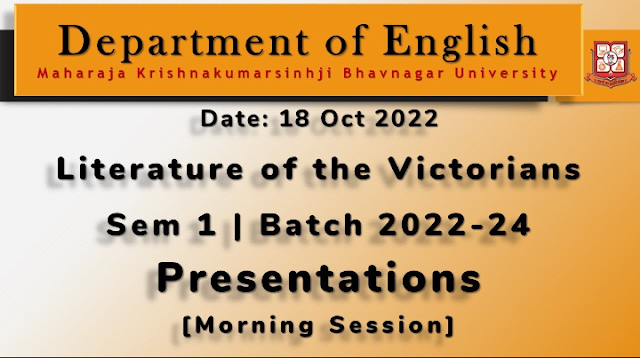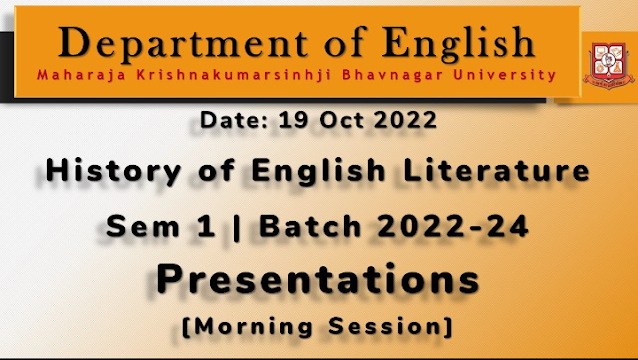TOPIC OF THE BLOG:-
This blog contains information and details about presentations which I gave, Topics I chose and other things about it.
PRESENTATIONS:-
This is my first experience of Presentation. 2 years ago I was totally afraid to say two words in English on the stage but in these months I learnt so much. Now I can speak English more fluently. I gave my 5 presentations in English. Of course I made so many mistakes but it's better than before.
Whole Presentation arranged by Dilip Barad Sir (Click here for Dilip Barad's Blog Site).
Here is my another blog on presentation which describes how presentations are arranged and go live on YouTube with the help of stream yard and other details (Click here).
1 - PRESENTATION:-
🌱 In my first presentation from the paper 101 - literature of the Elizabethan and Restoration period, unit 4 - Metaphysical Poetry, I choose the topic 'The Collar' poem by George Herbert and gave title 'The Collar Unbroken' to my presentation.
🌱 In first slide I gave topic of the presentation, from which paper I am going to discuss and place where I am going to present.
🌱 In second slide I gave personal information like my full name, enrollment number, email ID, batch, date, subject code and roll number. I also attached a gif related to this and also give credit to the original gif channel.
🌱In third slide I gave the information about Poet of the poem. I cited the Information from the authentic sources and also cited images or paintings which I embedded.
🌱In fourth slide I give the information about poem in same with the citations.
🌱 In fifth slide I decided the main idea of the poem with the help of shapes.
🌱 In next slide I described about what the poet think about his poem, some other information about the poem and citations.
🌱In next slide described various themes of the poem.
🌱Next two slides gave information about citations.
🌱 In last slide I end up with not only thank you but with a related quote and my Email.
🌱Here is a video recording on my YouTube Channel:-
2 - PRESENTATION:-
🌱In my second Presentation from the Paper 102: Literature of the Neo-classical Period, unit 4 - Samuel Richardson’s Pamela or Virtue Rewarded, I choose the topic Pamela's Comparison with Shamela (novel by Henry Fielding) and gave title 'Pamela or Shamela'.
🌱As upon in first slide, it's included place, paper and topic.
🌱Second slide included my Personal Information.
🌱 In third slide I give information about two authors. First one is Samuel Richardson and the second is Henry Fielding.
🌱In fourth slide I gave the information about 'Pamela'.
🌱 In fifth slide I gave information about 'Shamela'.
🌱Next slide has Comparison of Characters of the both novel.
🌱Next two slides included comparison of the both novel.
🌱In this slide I gave information about other novel which is rivalry work of 'Pamela'.
🌱 In this slide I gave my opinions on the rivalry.
🌱 Next two slides included information about works Citation.
🌱 And last slide has thank you with my Email ID and a related quote to the Presentation.
Here is a video recording on my YouTube Channel:-
3 - PRESENTATION:
🌱 In my third presentation from the Paper 103: Literature of the Romantics, unit 3 - Wordsworth and Coleridge, I choose the topic of criticism, Theory of Imagination by Coleridge, and gave title 'Coleridge's Theory of Imagination'.
🌱 First, Second, Eighth and Ninth slides are same as above I described.
🌱Third slide has the information about Coleridge.
🌱 Fourth slide included information about idea of Theory of Imagination and divisions of it given by Coleridge.
🌱 Next two slides included detailed information about Primary imagination, Secondary Imagination, Esemplastic Imagination and difference between Fancy and Imagination.
🌱 In this slide I gave my opinions and relation that how Imagination work in our life.
Here is a video recording on my YouTube Channel:-
4 - PRESENTATION:-
🌱In my Fourth Presentation from the Paper 104: Literature of the Victorians, unit 4 - Tennyson and Browning, I choose the topic Browning's Poems and gave the title 'Insights of Browning's Poems'.
🌱 First, Second, Ninth and Tenth slides are same as above I described.
🌱 In Third slide I gave the information about the Poet Robert Browning.
🌱 In fourth slide I described that how and why we like Browning's Poems.
🌱In this slide I described about love according to Browning.
🌱 In next slide it has clue that what and how Browning inspired us for our Desire an Achievements.
🌱 In this slide I described that how easy his poetry to understand and read.
🌱 In Third last slide I gave an opinion of other that what he thinks about Browning's Poems.
Here is a video recording on my YouTube Channel:-
5 - PRESENTATION:-
🌱In my fifth and last Presentation from the Paper 105A: History of English Literature – From 1350 to 1900,(I didn't choose from perticular unit), I choose the topic and gave title 'Influence of poetry on poets and writers'.
🌱First, Second, Eleventh, Twelfth and Thirteenth slides are same as above I described.
🌱 Third slide described about the word Influence meaning.
🌱 Fourth slide described about Poetry from ancient to modern, how it is remembered.
🌱Fifth and Sixth slide described about Influence of poetry on poets.
🌱In next slide I described about two songs from Plays by Shakespeare.
🌱Next two slides has information about Influence of poetry on philosophers and critics.
🌱 Next slide described that how poetry influences on myself and The little Poetry given in this slide written by me and also two pics are clicked by me.
Here is a video recording on my YouTube Channel:-
NOTABLE POINTS FOR BETTER PRESENTATION:-
🍅Use Authentic sites like Britannica, JSTOR, ResearchGate, Poetry Foundation which has good and well positioned writers or professors and avoid website like Wikipedia, Ukeassay, which don't have good Writers.
🍅Use not only words use GIF, Images, Diagrams, and Shapes related to topic.
🍅Use Articles for better Presentations.
🍅Use 7 to 15 Slides in one Presentation.
🍅Complete your Presentation in 15 minutes maximum and 5 minutes minimum.
🍅Use slides according to theme for better Presentations.
🍅 It is better if we ourselves made GIF, Poetry and other things related to Presentations, in short involve yourself in Presentations.
🍅 It is better if we included a slide on what we think about our presentation or topic which we choose for our presentation, in short our personal opinion.
🍅 Avoid the search results in citations like Shelley, Percy Bysshe. "Love's Philosophy By Percy Bysshe Shelley". Poetry Foundation, 1819, https://www.google.com/url?sa=t&source=web&rct=j&url=https://www.poetryfoundation.org/poems/50262/loves-philosophy&ved=2ahUKEwiB54OF5ID7AhWzzzgGHc_FBz0QFnoECBgQAQ&usg=AOvVaw2Kf2lCou2kInOrJL9l1BCZ
Note:- If you find any problem or question or suggestions please let me know☺️.
Words:- 1175
PPTs:- 5
Image:- 1

























.jpg)




